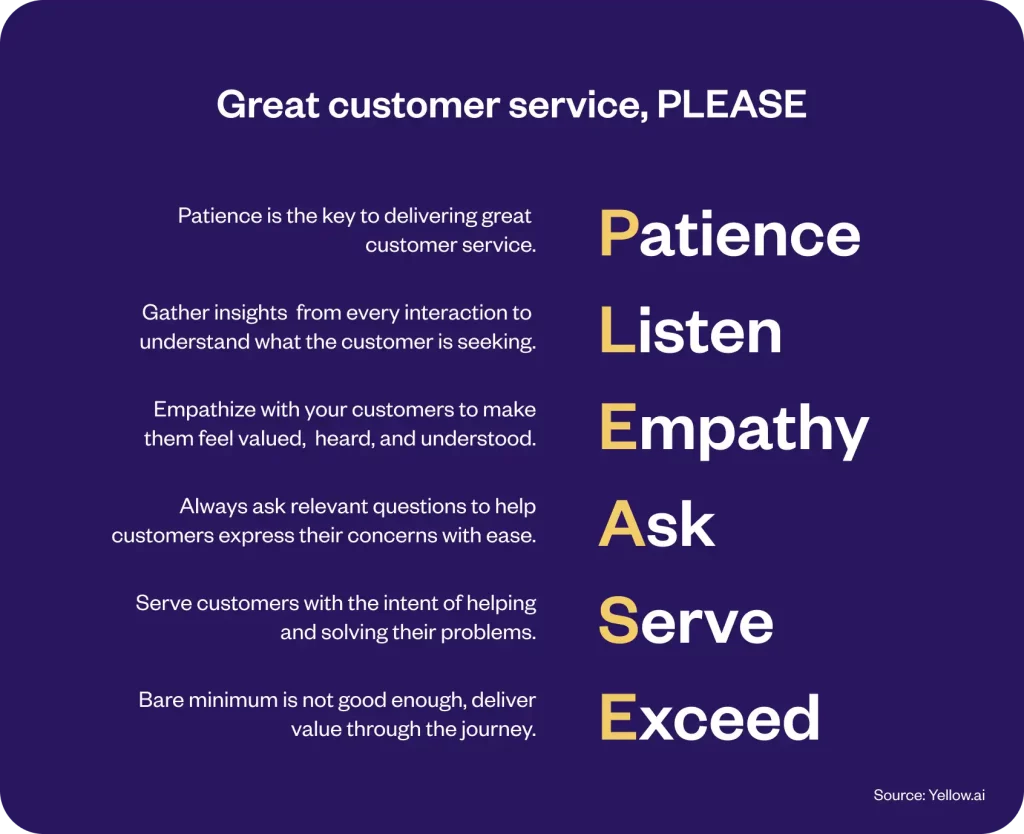Executive summary
Good customer service is one of the most defining factors behind a business’s success in 2025. It influences customer loyalty, retention, and long-term growth. Even the most well-designed products can fall short if the service experience fails to meet expectations.
Think from a buyer’s perspective: someone who spends $100 every month on your product, only to churn after a poorly managed interaction with your support team. It’s not just a missed ticket. It’s a lost customer.
An effective business strategy to boost customer satisfaction must never overlook or underinvest in the service function. As McKinsey notes, companies are increasingly transforming their business through redesigned customer journeys, products, services, and business models, positioning customer service teams as strategic growth enablers.
Good customer service, by definition, goes beyond fast replies. It’s built on trust, empathy, clarity, and contextual support across channels. Customer experience is the outcome, good service is the driver. In this blog, we explore the top ten characteristics of good customer service in 2025. These are traits that every enterprise must prioritize to meet rising expectations and create moments that matter.
Related must-reads:
- Customer service automation: Benefits and examples
- Customer Service Metrics That Matter in 2025: A Complete Guide to Measuring CX Success
- Customer service automation: Benefits and examples
What is Good Customer Service?
Good customer service is the ability to resolve issues, build trust, and deliver consistent value across every customer interaction—from the first inquiry to the final follow-up. It’s not just about being helpful. It’s about being intentional.
At its core, good service is about creating moments that feel human, even when automated, and in 2025, that means blending responsiveness, empathy, and problem-solving into every touchpoint.
A widely accepted mental model that distills this comes from Yellow.ai’s “PLEASE” framework: Patience. Listen. Empathy. Ask. Serve. Exceed. Each of these isn’t just a soft skill, it’s a service differentiator. Whether it’s how quickly an agent resolves an issue or how attentively a chatbot responds at 2 AM, these traits define modern customer care.

In fact, 88% of customers say that experience matters as much as the product itself. When customers can voice concerns easily, feel heard, and receive tailored support, loyalty follows.
Delivering good customer service also means empowering reps with deep knowledge: of your products, your processes, and your customer base. That confidence translates directly to trust on the customer’s end. Want to dive deeper into how this shows up in the real world? Explore these examples of good customer service to see what excellence looks like across industries.
What Are the Most Important Roles of Good Customer Service?
In 2025, good customer service doesn’t operate in a silo, it plays a critical role in driving business outcomes. From loyalty and LTV to product innovation, today’s service teams are deeply embedded in enterprise growth strategies.
The customer service software market continues to expand rapidly in 2025, with North America leading adoption, reflecting the shift toward experience-led differentiation. And as customer expectations evolve, support teams must now deliver across multiple fronts, not just ticket resolution.
Here are five strategic roles that modern customer service teams now fulfill:

1. Flagbearer of Trust:
Every interaction, whether resolving a complaint or sharing a proactive tip, is a chance to build trust. According to Forrester, loyal customers are willing to spend 50% to 200% more than casual ones. Customer service is where that loyalty is won or lost.
2. The Troubleshooter
Good service teams act like elite response units. From broken workflows to API issues, they solve problems fast, reduce friction, and leave customers feeling heard (and not handed off). In a B2B setup, this role is key to client retention.
3. The Brand Advocate
Support teams are a two-way microphone. They echo your brand’s values in every conversation and they feed insights back to the product, marketing, and CX orgs. When done well, they become internal champions for the voice of the customer.
4. The Experience Creator
Beyond fixing problems, good customer service creates moments of delight. A quick follow-up. A thoughtful escalation. A “we remembered you” touch. These aren’t extras—they’re what build customer loyalty at scale.
5. The Data Investigator
Every ticket is a dataset. Every conversation, a signal. Great service teams analyze trends, map friction points, and proactively inform upstream improvements, from CX flows to feature design.
Tip: Use the above list as a leadership training framework to evaluate your team’s maturity across these five roles.
What Are the Top 10 Characteristics of Good Customer Service in 2025?
Good customer service in 2025 isn’t just a checklist. It’s a capability that directly impacts enterprise outcomes: from retention and revenue to reputation. In a world where automation is table stakes and expectations are rising, these 10 traits define teams that deliver exceptional service consistently.
Whether you’re scaling support for millions or handling high-value enterprise accounts, these characteristics are what separate “responsive” from remarkable.
Let’s dive in.
1. Empathy & Active Listening
Empathy isn’t a soft skill anymore, it’s a service imperative. Especially when AI handles routine tasks, human agents are now trusted with emotionally complex, high-value interactions.
Truly great service begins with listening without interruption, validating concerns, and responding with care. Empathy is a top driver of trust and loyalty in post-pandemic service models.
Bad practice: Jumping to canned responses before understanding the real issue
Good practice: Reflecting the customer’s emotion, asking clarifying questions, and resolving holistically
Empathy isn’t about being nice. It’s about making customers feel seen and supported…and that’s what builds lifetime value.
2. Problem-Solving Skills
Good customer service means solving, not just “responding”. It’s not enough to acknowledge an issue; service teams must quickly understand the root cause and resolve it with confidence.
In high-volume or complex B2B environments, this often involves cross-functional coordination, advanced product knowledge, and the ability to think several steps ahead.
Why it matters: Fast fixes build satisfaction. But smart fixes build trust.
Enterprise tip: Empower agents with AI-powered agent assist and searchable knowledge bases so they can resolve without escalation.
When agents are trained to solve (and not stall), key customer service metrics like customer satisfaction (CSAT) and Net Promoter Score (NPS) all improve dramatically.
3. Clear and Concise Communication
No jargon. No fluff. Just clarity.
The ability to explain things in a clear, professional, and timely manner is one of the most undervalued, but business-critical, customer service skills. Vague responses or deflected accountability often frustrate customers more than the original issue.
Bad: “It seems like there might be a delay, maybe from our backend or delivery team.”
Good: “Your order is delayed due to high demand. Delivery is rescheduled for 3 days from now. We’ve applied a 20% coupon for the inconvenience.”
Clear communication prevents churn. And in enterprise settings, it safeguards deal momentum and account trust.
4. Friendliness and Positive Attitude
Tone is the invisible layer in every conversation. A positive, empathetic attitude helps de-escalate frustration, humanizes the brand, and creates lasting impressions.
Friendly support doesn’t mean informal. It means being solution-oriented and genuinely invested in helping.
Pro tip: “Let’s get this sorted together” is often more impactful than “Let me check.”
A helpful demeanor turns an ordinary service moment into one worth remembering.
5. Product and Service Knowledge
Great service agents don’t just answer questions, they instill confidence. They understand the nuances of your products, industry-specific use cases, and how to tailor solutions. On-ground conversations have proven time and again, how a knowledgeable representative is critical to a positive experience.
Scenario: In a B2B call, the customer asks about API usage limits.
A trained agent says: “Based on your traffic, we recommend async calls with caching to avoid latency during peaks.”
Deep product fluency avoids escalations and positions your support team as consultative partners, not just fixers.
6. Timeliness and Responsiveness
Speed still matters, but not at the cost of substance. Enterprise-grade customer service must strike the right balance between urgency and accuracy. LiveChat found that 88.7% of users are satisfied when connected to a rep in under 30 seconds
Productivity increases for Hyundai agents

⏱️ Response time isn’t just a metric. It’s a signal of reliability.
Set clear SLAs, reduce internal handoffs, and use smart routing to meet customers where they are, fast.
7. Professionalism and Courtesy
Politeness never goes out of style.
In tense situations or long-term contracts, how your support team handles tough conversations can either build bridges or burn them. Professionalism includes managing tone, avoiding blame, and staying composed…especially when the customer isn’t.
Tip: Even when you can’t solve the issue, how you handle the communication matters more than you think.
At Yellow.ai, enterprise clients often note that our support team feels like an extension of their own, because professionalism builds partnership.
8. Personalization and Tailoring
Customers expect service that remembers who they are, not just what they bought. Zendesk’s CX Trends report found that 70% of consumers expect agents to have full context of their past interactions. Personalization isn’t just a nicety, it’s a standard.
By using data like purchase history, preferences, and communication style, teams can deliver contextual, relevant support.
Yellow.ai enables this by powering personalized customer experiences across chat, email, and voice, all while respecting customer privacy.
Want more examples? See how leaders deliver great service at scale.
9. Going the Extra Mile
Proactive service creates “wow” moments. Whether it’s following up after a ticket is closed or offering a surprise benefit to make up for a delay, small gestures build big loyalty.
According to Microsoft’s State of Customer Service, 96% of customers say service is a major factor in brand loyalty.
Ways to go the extra mile:
- Send a follow-up thank-you email
- Offer priority support after a major issue
- Give loyal users early access to features
These aren’t expenses. They’re investments in lifetime value.
10. Adaptability and Willingness to Learn
Customer expectations change fast. So must your support team.
The best customer service teams today adapt to new tools, platforms, and customer behavior. They embrace omnichannel support, self-service, AI co-pilots, and continuous learning.
Being great at service today doesn’t guarantee you’ll stay great tomorrow.
Train your agents to handle complexity, shift between channels effortlessly, and stay curious. That’s the real unlock for sustained service excellence.
How Yellow.ai Helps Enterprises Operationalize Good Customer Service with Agentic AI
Delivering good customer service at scale is no longer about adding more agents or deploying siloed automation. It’s about enabling intelligent, human-like service—powered by AI agents that can act, adapt, and improve continuously.
That’s where Agentic AI comes in.
At Yellow.ai, we help enterprises move from static workflows to autonomous, decision-making service agents that embody the 10 traits of great service, at speed and scale.
Here’s what that looks like in action:
1. Empowering Empathy at Scale
Empathy isn’t easy to automate. But with real-time context recognition and sentiment-aware agents, enterprises can respond to customer emotion, and not just input. This allows teams to acknowledge, adapt, and act with empathy…without missing a beat.
2. Resolving Faster, Smarter
Great service is proactive. Our Agentic AI agents autonomously detect intent, retrieve relevant knowledge, and resolve queries across channels, without escalating unnecessarily. That’s how enterprises deflect 80%+ of inquiries without compromising quality.
3. Creating Personalization That Feels Human
Customers don’t want generic service, they want relevance. Yellow.ai agents tailor conversations based on behavior, preferences, and history. It’s not just personalization. It’s precision.
4. Meeting Customers in Their Language
Language is trust. Yellow.ai supports 135+ languages natively, enabling enterprises to deliver culturally fluent support that feels personal, no matter where your customers are.
5. Being There When It Matters
Agentic AI agents operate 24/7, across time zones and channels. And unlike chatbots, they’re built to think, not just reply. So customers get continuity, not canned responses.
6. Turning Feedback Into Action
Every interaction is a datapoint. Yellow.ai turns those signals into insights that help CX leaders refine journeys, improve products, and elevate outcomes.
7. Reducing Cost, Without Cutting Corners
When done right, good customer service doesn’t cost more. It delivers more. Our platform helps enterprises reduce support costs by up to 60%, while improving Customer Satisfaction (CSAT), First Contact Resolution (FCR), and Retention.
Agentic AI is how enterprises go from serving customers to truly understanding them. From handling volume to building value. That’s the new standard for good customer service.
Embracing futuristic customer service

Key Takeaways
Good customer service isn’t just a department-level priority, it’s a business driver. Whether you’re hiring new support talent or upskilling an existing team, these 10 characteristics are your blueprint for service excellence.
Of course, no agent embodies every trait from day one. But with the right training, systems, and leadership focus, teams can evolve: from reactive problem-solvers to proactive value creators.
And if you’re already seeing gaps in responsiveness, empathy, or consistency, now’s the time to act. These aren’t just soft skills. They’re service differentiators that directly impact revenue, retention, and reputation.
Start small. Coach deliberately. Measure what matters.
And most importantly, design your customer service around the people it’s meant to serve.
If you’re looking to operationalize these traits with AI-powered service teams, Yellow.ai can help.
But whether you use our platform or not, the principle holds: In 2025, good customer service is good business.
FAQs: Good Customer Service
What is good customer service?
Good customer service means delivering timely, empathetic, and effective support across every customer touchpoint. It focuses on resolving issues, creating trust, and building lasting relationships—whether through human agents or AI-powered interactions.
What are the key characteristics of good customer service?
The top 10 characteristics include empathy, problem-solving, clear communication, product knowledge, responsiveness, personalization, professionalism, friendliness, adaptability, and a willingness to go the extra mile.
Why is good customer service important for businesses?
Good customer service directly impacts customer retention, satisfaction, and lifetime value. In fact, companies that prioritize service see higher loyalty, stronger brand perception, and better long-term revenue growth.
How can companies improve customer service in 2025?
To improve service, businesses must blend strong hiring and training practices with intelligent tools like AI agents, omnichannel support systems, and real-time analytics that drive faster, more personalized experiences.
Can AI help deliver good customer service?
Yes. When implemented correctly, AI can enhance service quality by automating routine queries, providing 24/7 support, and equipping agents with the tools and insights needed to deliver more empathetic, informed responses.













